
by AmyPlano | Jul 2, 2018 | General information about PCOS, PCOS and metabolism, Uncategorized, Weight Loss
So it is true … this girl right here turns 40 years old on Friday, June 29th. And what better way to celebrate my 40th then with YOU my loyal readers. So how would you like to receive a present from me? How does a 40 % discount on a metabolism test to celebrate this fabulous occasion sound? I don’t know about you but it sounds pretty dang awesome to me.

Heading into the next decade can be a drag. So rather than have a pity party for myself I decided to give you a pretty sweet present to mark this milestone birthday – 40 % off metabolism testing for the whole month of July. Whoot! Whoot!

For the whole month of July redeem coupon code thisis40 when scheduling your metabolism test to receive 40 % off each individual test. The normal rate for a metabolism test is $150.00. Therefore, by redeeming the code thisis40 you save yourself 60 bucks! If that is not pretty sweet – then I don’t know what is.
Important note: In order to receive the most accurate reading on the metabolic test you should be fasted (no food), with no exercise or caffeine within 4 hours of your test time. You can drink plenty of water – just nothing with caffeine or calories.
Below are the steps to redeem your discounted metabolism test:
- Click HERE and you will be re-directed to the scheduling section of this website.
- Click the link for “Metabolism Testing” under appointments.
- When the prompts ask you “with” who you would like to schedule you can choose either myself or my fabulous RD Audrey. The discount applies to us BOTH.
- Select the time slot you would like to come in for your metabolism test.
- Next put in your name, phone number and email address.
- Within the information section where it says “Redeem Coupon” put in the discount code thisis40
- Follow the prompts for payment
- Once you have provided payment you will receive an email confirmation with the date and time of your visit.
- Arrive fasted, with no caffeine or exercise within 4 hours of your test.
Our office is located at 500 Boston Post Road, Orange, CT 06477. We are in the same plaza as Hawley Lane Shoes. When you pull into the plaza look for signs for The Plano Program.
Over the next month I will be releasing more information about why having your metabolism tested is SO friggin’ important – so stay tuned for blog updates.
Please fee free to share this birthday gift with anyone who you think might benefit – which I think is pretty much anyone with nutrition related goals. After all who does not want to know their metabolism? Said no one ever ?
Have you ever had your metabolism tested? Did you find it helpful in reaching your nutrition related goals. Please tell us your experience in the comments below.


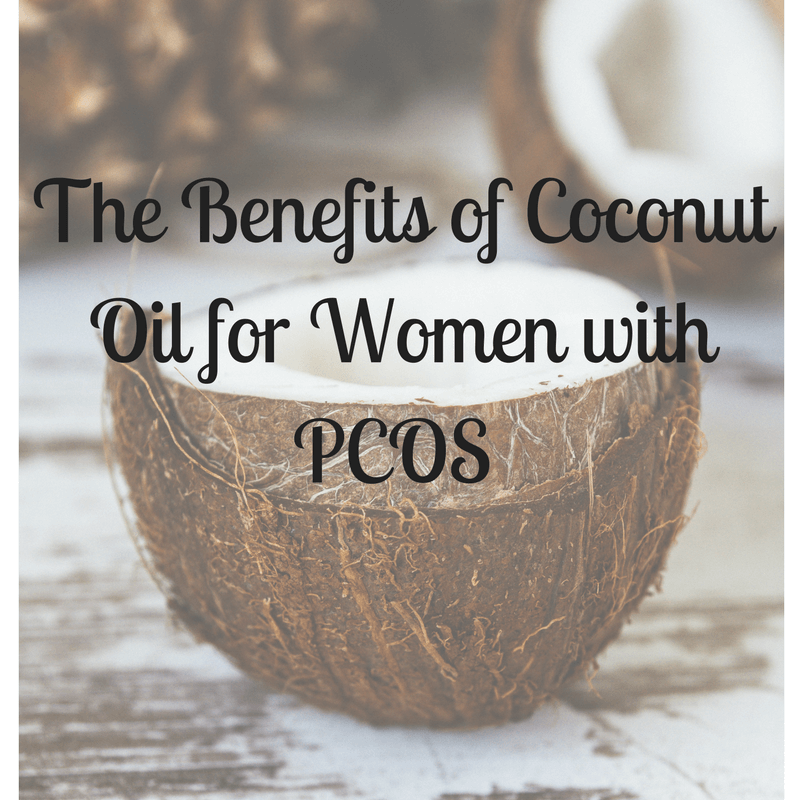
by AmyPlano | Jan 6, 2017 | PCOS and Fats, Weight Loss
The Nutritional Benefits of Coconut Oil for Women with PCOS
Did you know there are many nutritional benefits of coconut oil – especially for women with PCOS? In this blog, I discuss the nutritional benefits of coconut oil, what terms to look for when purchasing, as well as how to incorporate coconut oil into your current PCOS lifestyle. If that is not exciting – then I don’t know what is 🙂
It seems like no matter where you turn – social media, twitter, newspapers (yes, they do STILL exist!) or even your best friend – someone is talking about coconut oil. They may not know what they are talking about – but they are still talking!
Some folks say coconut oil is “bad” while other experts tout it as the next superfood. So what’s a girl with PCOS to do? Should you go out and buy jars of it? Or should you drop it like it’s hot and hope everyone stops talking this tropical oil?
Well fret not ‘cysta! The PCOS Dietitian is here to give you the 411 on coconut oil.
What the heck is Coconut oil?
To make coconut oil, manufacturers press the fat out from the white “meat” inside a coconut. Coconut oil consists mostly of saturated fatty acids. When most people think of the word “oil”, they think of a liquid fat like olive or avocado oil. However, due to its saturated nature, coconut oil it is actually solid at room temperature! If you have never seen it before, it actually looks pretty similar to shortening. However, thankfully it has none of the icky properties of that yucky oil!
Soooooooooo … I know what you are thinking. You just heard the nasty word saturated fat and you are officially in freak out mode. Hang in there ‘cysta I have some good news that is going to blow your mind.
The Super Hero of Coconut Oil – Medium Chain Triglycerides
Coconut oil’s saturated fats are primarily composed of medium chain triglycerides or more commonly known as MCTs. MCTs behave differently than other saturated fats in the body and because of this factor have a positive effect on many of the systems in the body.
Warning – it’s about to get nerdy! Skip this paragraph if you just want the ‘cliff’ notes version! MCTs get their name because of the length of their chemical structure. All types of fatty acids are made up of strings of connected carbon and hydrogen atoms. Fats are categorized by how many carbons they have: short-chain fats have fewer than six carbons, medium-chain fats have between 6–12 carbons and long-chain fats have between 13–21 carbons. Why do we even care about this nonsense you ask? Well because they are smaller, MCTs get into our cells easier and are quickly absorbed.
MCTs are powerhouses. They have soooooo … many benefits!

So many benefits of MCTs
MCTs can help promote weight loss, decrease hunger, stabilize blood sugar and enhance immune and cognitive functions. Many studies also support MCT’s role in thyroid health. MCT oils have multiple benefits relating to cardiovascular health such as the ability to decrease total cholesterol as well as triglycerides.
What KIND of coconut oil should I buy?
Just like everything in the food industry today, some coconut oils are healthier than others. Two types of coconut oils exist – refined and unrefined. Can you can guess which one is the healthier of the two!?!
Refined Coconut Oil
Refined coconut oil is subjected to various chemical solvents, deodorizers and bleaches. In the refining process, coconut oil is exposed to high temperatures. Many of the refined coconut oils on the market also contain trans fats. Trans fats have a negative impact on heart health. Refined coconut oil is tasteless, odorless, and no surprise has a lower nutrient content. Avoid refined coconut oil like the plague.
Unrefined Coconut Oil
On the other hand, unrefined coconut oil aka virgin coconut oil, extra-virgin coconut oil or raw coconut oil is unadulterated. It is minimally processed which means it has a higher nutrient content. When you open up a jar of coconut oil – it smells like it should – like coconuts! If it is does not smell like coconuts, it is likely refined.
Additional terms to describe coconut oil
You may also hear the terms “expeller-pressed coconut oil” and “cold-pressed coconut oil.” Expeller-pressed coconut oil goes through a harsher process at a higher temperature which results in a loss of nutrients. Cold-pressed coconut oil is processed at a lower temperature and the greatest amount of nutrients are preserved.
Lastly, you want to see the term “organic” on the label as well. This guarantees that the oil is not produced through genetic engineering.
So, in short, look for the words organic, cold-pressed and unrefined when purchasing coconut oil.
Where can I buy coconut oil?
You can find coconut oil at most grocery stores, health food stores, and even some drug stores. In grocery stores you can find it in the natural foods aisle. I have also pleasantly seen coconut oil in stores like Costco, Trader Joe’s and even TjMax! Depending on the size, coconut oil can cost anywhere from $6.00 – $20.00 per jar. Make sure it is solid not liquid when you buy it. Keep it in cabinet to decrease its exposure to light or high temperatures. When the temperature is above 75 degrees – the coconut oil turns into an oil! So be careful.
How can coconut oil specifically help women with PCOS?
Unrefined, organic coconut oil has the potential to help women with PCOS in a variety of ways. Below are just a couple of the what I feel are the most important benefits.
Blood glucose levels. Many women with PCOS often experience unstable blood sugar levels. This can lead to dizziness, irritability, fatigue and increased hunger. Coconut oil can help stabilize blood sugar levels. Some studies have also demonstrated that coconut oil can also have a favorable impact on insulin secretion. Double win!
Improves blood lipid profile. The risk of getting heart disease increases when you have PCOS. Coconut oil can help raise levels of HDL (along with a consistent exercise program, of course!) or what we call our good cholesterol. It also can help reduce the level of fat (triglycerides) in the blood. (But be mindful it can also raise LDL cholesterol – or your lousy cholesterol – a number which you want low!) This is especially beneficial for women with PCOS ♥
Helps with hypothyroidism. While thyroid issues do not soley exist in this demographic, they can nonetheless be extremely problematic in women with PCOS. Coconut oil helps improve thyroid function and speeds up fat breakdown.
Weight maintenance. By nature of the syndrome, women with PCOS have an increasingly difficult time keeping the weight off. Since coconut oil is a source of fat, it can help you feel full and keep your weight at bay.
Summary of the key attributes of coconut oil for women with PCOS ♥♥♥
stabilizes blood glucose levels
Improves blood lipid profile
Helps with thyroid regulation
Promotes an ideal weight
Like with any type of fat, you always need to proceed with caution. Coconut oil is no exception to this rule. Every tablespoon of coconut oil is 120 calories and 13 grams of fat. These calories can add up pretty quickly! So while I sincerely believe there are some great benefits to coconut oil for women with PCOS I would urge you to use it in place (NOT in addition to!) of the fat you are using in your diet.
More so, it is important to be crystal clear that I am also not advocating coconut oil as your only source of dietary fat. The PCOS Dietitian ♥ variety! So please just throw it into the “mix” and expose yourself to all the different nutrients present in this oil. Start slow – only with about 1 teaspoon at a time. When consumed in large amounts too quickly coconut oil can cause diarrhea. And I don’t know anyone who enjoys diarrhea 🙂
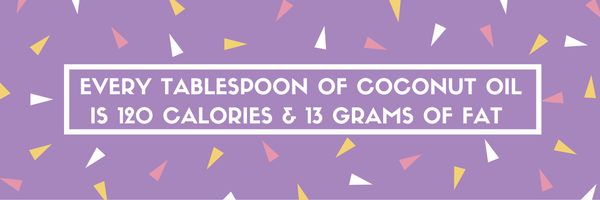
Now, that you know all the benefits of coconut oil, here are some different uses:
Cooking or frying. You can use coconut oil as the base of the pan when cooking or frying your favorite dish. It is especially good in a stir-fry! Many of my patients even like it in scrambled in their eggs!
Baking. You can use coconut oil in recipes to make sure your baked good come out nice and flaky. Make sure to melt the coconut oil first! Then you can use it in its liquid state to replace vegetable oil and butter in recipes.
Smoothies. One of the things I often put on my patient’s meal plans are smoothies. I always like to include a source of fat into smoothies. I find that smoothies are much more satisfying with fat! While peanut butter is often my go-to choice for chocolate based smoothies, I prefer coconut oil for fruit-based ones. I recommend putting about 1 tablespoon in a small glass cup and putting it in the microwave for about 15 seconds. This will liquify the oil. Then you can add it directly into the blender when making your smoothie.
Coffee or Tea. Coconut oil can make a great addition to your coffee or tea in the morning. We refer to this drink as bullet proof coffee. I know it sounds crazy but just try it! It makes the coffee super-duper creamy. Yum!

And … when in doubt – eat it by the spoonful.

There is no shame in taking a good ol’ spoonful of coconut oil. I guarantee it will make you smile. Just like these happy little spoons 🙂
If you are not a big fan of cooking or baking, you can get the same benefit by eating one spoonful of coconut oil per day as you would by using it in your meals.
In addition, topical coconut oil has been shown to have a positive effect when rubbed consistently on thinning hair related to PCOS. While I am only familiar with the dietary aspects of coconut oil, it seems like this often pops up in my reading. So I felt like it was fair to throw that out at you especially if hair loss is something you struggle with.
So I hoped you learned a thing or two about coconut oil. When consumed in addition to other heart health fats like olive oil, grass fed butter, nuts and avocados – coconut oil has the potential to have a positive impact on PCOS symptoms. While I am by no means advocating it as a “cure” for ALL PCOS symptoms – it certainly has the potential to help with some of the major ones like dyslipidemia, hypoglycemia, elevated weight and hypothyroidism. So please give it a try – I am pretty sure you will enjoy it! And remember – always buy organic, virgin (or extra-virgin) cold-pressed if you can and skip the refined stuff!
Are you a coconut oil fanatic? Do you have some fun, exciting ways to incorporate this oil into your diet? Our community would love to hear your thoughts. Please let us know in the comments below how you using coconut oil.


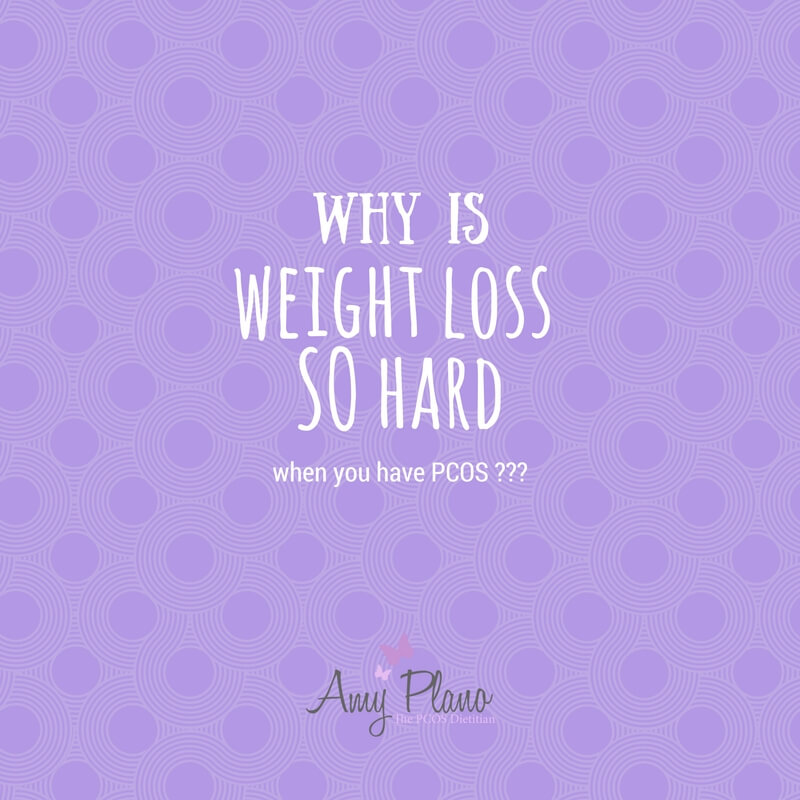
by AmyPlano | Sep 1, 2016 | PCOS and Weight Gain, PCOS Medications, Weight Loss
Why Is Weight Loss SO hard when you have PCOS?
Did you know that weight loss can help with improving almost all the symptoms of PCOS? Even a modest weight loss of 5 – 10 % of a woman’s initial weight can lead to improvements in insulin sensitivity, ovulation and fertility! But, I know this is easier said than done. Weight gain and weight loss are two of the most common issues women with PCOS are forced to deal with.
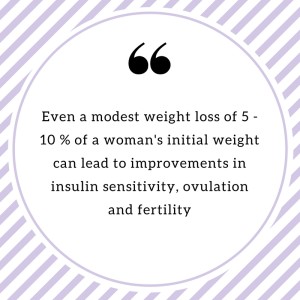
But, what gives ? Why is weight loss so hard if you have PCOS? Well my dietetic intern Jackie Budlowski and I are here to lay the smack down and give the 411 of why the heck it so friggin’ challenging to lose weight when you have PCOS. Get your notebook out — these are some golden nuggets of information 🙂
Insulin
I truly believe insulin is one of the most important hormones in controlling weight! Your pancreas secretes insulin to regulate your blood glucose levels. In most individuals, insulin helps lower one’s blood glucose levels by shuttling glucose into the cells where it can be used for energy. However, most women with PCOS do not effectively process glucose. They experience what is called insulin resistance.Their bodies are less sensitive to the effects of insulin. In response, the pancreas dumps out even more insulin, leading to high insulin levels, or what is known as hyperinsulinemia.
High levels of insulin signal to the body that energy is abundant. In turn, rather than use the extra energy as fuel, women with PCOS store excess glucose as fat. Therefore, one of the biggest keys to controlling weight is to regulate blood sugar and control insulin levels. This is best accomplished through a moderate carbohydrate diet supplemented with the insulin sensitizing agent metformin.
If you are not already familiar with the benefits of metformin please read my previous blog post which will bring you up to speed.
Slow Metabolism
Women with PCOS have been shown to have a slower metabolic rate. This is based on many factors but the primary one being the amount of body fat women with PCOS tend to carry. Your metabolic rate is the number of calories you need for your body and organs to work. You see, body fat is what I consider metabolically “dead.” It does nothing for you but kind of just hang there.
Muscle on the other hand is very thermogenic. It burns more calories than fat does – even while at rest. In fact, muscle tissue is about 8 times more metabolically demanding than fat. A higher percentage of lean body weight (muscles) results in a higher metabolism compared to people of the same weight with a lower percentage.
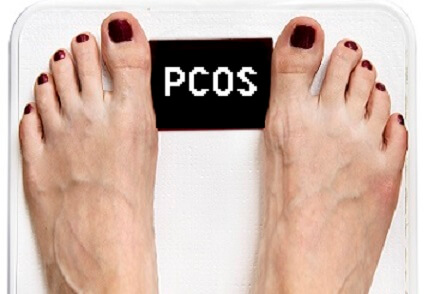
If you have a slower metabolic rate, this means you must consume fewer calories than the average woman. Eating more calories than you burn can lead to weight gain. In future blog posts we will discuss some of the different ways to improve your metabolic rate (Hint – Hint : strength training is definitely one of them!)
If you are curious what your metabolic rate is and you live in the Connecticut area shoot us an email at amy.plano@yahoo.com. We can set up a time to test your metabolism. We have a device called the Bodygem which tests your metabolism by using a simple breathing device. The Bodygem is the “gold standard” of metabolism testing devices. Don’t believe us ? Click here bodygem validation to review the research. The cost of the test is $150.00. You must be fasted, with no caffeine or exercise for 4 hours before the test.
Appetite Hormones
There are a number of hormones involved with hunger and appetite control. Ones of particular interest for women with PCOS are leptin, cholecystokinin (CCK) and insulin. These hormones are responsible for signaling to the body to tell it that is it full and to “stop eating.” Research has shown that women with PCOS have altered hormone signals, which may lead you to feel constantly hungry even when you are consuming enough calories. This leads to overeating, increases in body fat and overall lower esteem. Not a winning combination for weight loss.
Leptin
Did you know that your fat cells produce hormones? This is one reason women who carry a significant amount of body fat often have hormonal problems. One of the hormones produced by your fat cells is leptin. This hormone sends a signal to the hypothalamus gland in your brain when fat cells are full. Due to the fact that cells produce leptin in proportion to their size, overweight women with PCOS also have very high levels of leptin.
Given the way leptin is supposed to work, women who are overweight and have PCOS should have a diminished appetite. But we know this is not the case. You can have a lot of fat making a lot of leptin, but it doesn’t turn the hunger valve off. The brain isn’t listening. No drop in appetite. In fact, your brain might even think you’re starving. This because as far as it’s concerned, there’s not enough leptin! So you get even hungrier. This condition is known as leptin resistance. This causes an up regulation of appetite. This supports why women with PCOS tend to constantly be hungry despite taking in an ideal amount of calories.
Cholecystokinin (Alias: CCK)
Therefore, it may come at no surprise that women with PCOS often feel less satisfied after a meal than women without PCOS. This can be attributed to the hormone cholecystokinin (CCK). CCK is responsible for telling your body you are full after a meal. Women with PCOS are reported to secrete less CCK in response to a meal. So, if your CCK levels are lower, this means you will be hungrier after meals despite just eating. It has also been speculated that impaired CCK secretion may play a role in the greater frequency of binge eating in women with PCOS.
Not so awesome, right ? But the plot thickens …
Insulin
Lastly, insulin also acts as an appetite stimulating hormone. You may already be familiar with the concept of insulin resistance and PCOS. If you are not click here to brush up on your knowledInsulin resistance occurs when there is a lot of insulin being produced (such as, with many women who have PCOS), but the body and brain have stopped “listening” to insulin’s effects. The scenario becomes : you eat, your body releases insulin, but your body still tells you to eat more. So you eat more and increase the likelihood of storing the food you do eat as excess body fat. And if this is not bad enough – you rarely feel satisfied.Therefore, high levels of insulin may be one of the many reasons why you may experience more hunger than other people. Higher hunger levels inevitably leads to more eating which results in weight gain.
Just because it is harder to lose weight, doesn’t mean it is impossible. Here are some tips on how to take the bull-by-the-horns and make your hunger hormones work for you!
Weight loss & PCOS: How to manipulate your hunger hormones for weight loss
Pump up the protein
Do your best to have protein at all meals, but especially at breakfast. Breakfast sets the “appetite tone” for the day! Therefore, consuming high-quality protein sources such as eggs, Greek yogurt or cottage cheese with some nuts will help reduce your hunger hormones and keep your appetite at an even keel throughout the day.
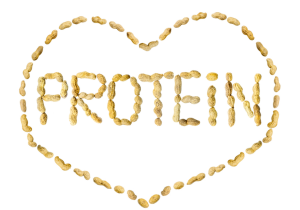
Skip the processed carbs (duh!)
Stay away from refined-carbohydrate-only meals and snacks such as cereal, a bowl of pasta, crackers, chips and starchy snacks. Even having a healthy snack such as fruit alone can trigger a spike and an immediate drop in insulin, so add some nuts, a piece of cheese or Greek yogurt to your fruit.
Focus on high fiber foods
Fiber is deeply tied to satiety. High volume, low-calorie, nutrient dense foods delay gastric emptying keeping food in the stomach for a longer period. Therefore, do your best to include foods such a vegetables, high fiber cereals, fruit and legumes to keep hunger at bay. The goal is aim for 25-30 grams of fiber spread throughout the day.
Eat a diet rich in omega-3 fatty acids to boost leptin
People who are overweight tend to release too much of a group of molecules that the body uses to combat inflammation. These molecules reduce leptin’s ability to communicate with the brain. They are thought to be one of the underlying causes of leptin resistance. Omega-3 fatty acids decrease the production of these molecules by reducing inflammation in the body. The body does not produce omega-3 fatty acid therefore you must get from the diet. Foods high in omega-3 fatty acids include grass-fed meats, walnuts the fattier fish salmon, anchovies, sardines, mackerel, trout as well as chia seeds, flax seeds, summer squash and kale. Aim for about 800 – 1000 mg per day.
Foods high in omega-3 fatty acids include grass-fed meats, walnuts the fattier fish salmon, anchovies, sardines, mackerel, trout as well as chia seeds, flax seeds, summer squash and kale. Aim for about 800 – 1000 mg per day.
While the hormones that effect and control your hunger might be seen as complex, the three I’ve just discussed are keys to to unravelling this complicated web of PCOS, hunger and weight gain. As you can see, there are many factors at play, beyond just your determination to eat properly. These are factors I want you think about when you become frustrated with your PCOS and weight gain.What is important to understand is that your behavior around eating is not always something you can always consciously regulate.
Be confident and believe in yourself. Weight loss may initially be a struggle, but with the proper approach I am confident you can do it!



by AmyPlano | Aug 5, 2016 | PCOS and metabolism, PCOS Medications, Weight Loss
If you have PCOS  , there is a good chance you have heard of the medication metformin. However, what you may not know is why it was prescribed for you in the first place. So much of the advice I give to patients surrounding diet revolves around many of the same reasons and principles why women with PCOS are put on metformin. Therefore, I thought it would be beneficial to discuss the basics of metformin and how it can help with insulin resistance, decreasing your testosterone, improving your chances of ovulation, enhancing fertility and you guessed it – weight loss!
, there is a good chance you have heard of the medication metformin. However, what you may not know is why it was prescribed for you in the first place. So much of the advice I give to patients surrounding diet revolves around many of the same reasons and principles why women with PCOS are put on metformin. Therefore, I thought it would be beneficial to discuss the basics of metformin and how it can help with insulin resistance, decreasing your testosterone, improving your chances of ovulation, enhancing fertility and you guessed it – weight loss!
What the heck is metformin?
Metformin is an insulin-sensitizing agent. What this means is metformin makes your body more sensitive to the effects of the hormone insulin. But more about that later!
Metformin comes in tablet form and the dose is gradually increased until the maximum dose required is achieved. Most women with PCOS start at a dose of 500 mg and increase their dose up to 1500 – 2000 mg usually in a 4-6 week span.
Metformin does the following:
- inhibits liver production of glucose
- increases the uptake of glucose by the cells
- decreases oxidation of fatty acids
- decreases the absorption of glucose in the intestines
Note: Metformin is the most commonly prescribed drug for diabetes.
I have PCOS, NOT diabetes? So, why did my GYNO prescribe metformin for ME?!?
Around 70- 80 % of women with PCOS experience what is called Insulin Resistance (IR). If you have IR, your body produces enough insulin, but does not effectively use it. Therefore, your body is not sensitive to the effects of insulin. Your doctor prescribed metformin to help your body respond better to insulin.

Why is insulin SO dang important?
Insulin plays a critical role in metabolism—the way the body uses food for energy. When you eat, the digestive system breaks down carbohydrates—sugars and starches found in many foods—into glucose. Glucose is a form of sugar that enters the bloodstream. With the help of insulin, glucose gets processed into the cells where it is used for energy.
What is Insulin’s Role in Blood Glucose Control?
When blood glucose levels rise after we eat, the pancreas releases insulin into the blood. Insulin and glucose then travel in the blood to the cells throughout the body.


In a healthy person, these actions help regulate blood glucose to keep insulin levels within a normal range.
But I already told you, my doc told me I am NOT healthy! I have PCOS AND Insulin Resistance SO what does that mean?
When someone has insulin resistance their muscle, fat, and liver cells do not respond properly to insulin. Their bodies cannot easily absorb glucose from the bloodstream. As a result, the body needs higher levels of insulin to help glucose enter cells. Basically the cells, despite the presence of insulin in the bloodstream, don’t function properly and don’t allow the glucose in the blood into the cells.
What Role does Insulin Resistance play in PCOS and Weight Loss ?
Insulin is considered a storage hormone. When insulin levels are high (as they are in most women when they are diagnosed with PCOS), the body goes into storage mode. This means the body stores glucose as body fat instead of using it for fuel.
And guess what? What do you think has one of the biggest affects on raising insulin levels? Carbohydrates – especially the refined types! Eating substantial amounts of processed carbohydrates creates large spikes in insulin levels. For women with PCOS – this is like pouring salt on an open wound. No bueno amiga!
As you know, many women who have PCOS are already overweight and carry a substantial amount of body fat in their belly area. Elevated weight and belly fat can further increase IR. Therefore, it no surprise that women who have PCOS have a hard time losing weight – even if their diet and exercise are “spot on.” Insulin resistance and excess weight creates a vicious cycle of weight gain in women with PCOS. And for some – without metformin – this weight is increasingly difficult to take off.
As if that was not bad enough! IR also increases testosterone levels, disrupts menstrual cycles and decreases a women chance of fertility.
How Does Metformin Benefit Women with PCOS?
Metformin is a super hero in my book for women who have PCOS and IR!
Metformin has been used off label in PCOS to prevent diabetes and increase ovulation through weight loss (1). In a recent randomized controlled trial comparing metformin, oral contraceptive pills (OCPs), and the combination of the two in patients with PCOS without T2D, metformin alone or with OCPs decreased weight and BMI. The median decrease in weight with metformin at 12 months was 3 kg (25th and 75th quartiles; -10.3, 0.6). OCP use was associated with increased weight changes of 1.2 kg (25th and 75th quartiles; -0.8, 3.0), and the combination decreased weight by 1.9 kg (25th and 75th quartiles; -4.9, 0.1). One patient in the metformin group dropped out due to nausea; no other side effects or adverse events were reported (2). Therefore, by using metformin by itself or in conjunction with OCPs, women with PCOS experienced a significant decrease in weight over the course of one year.
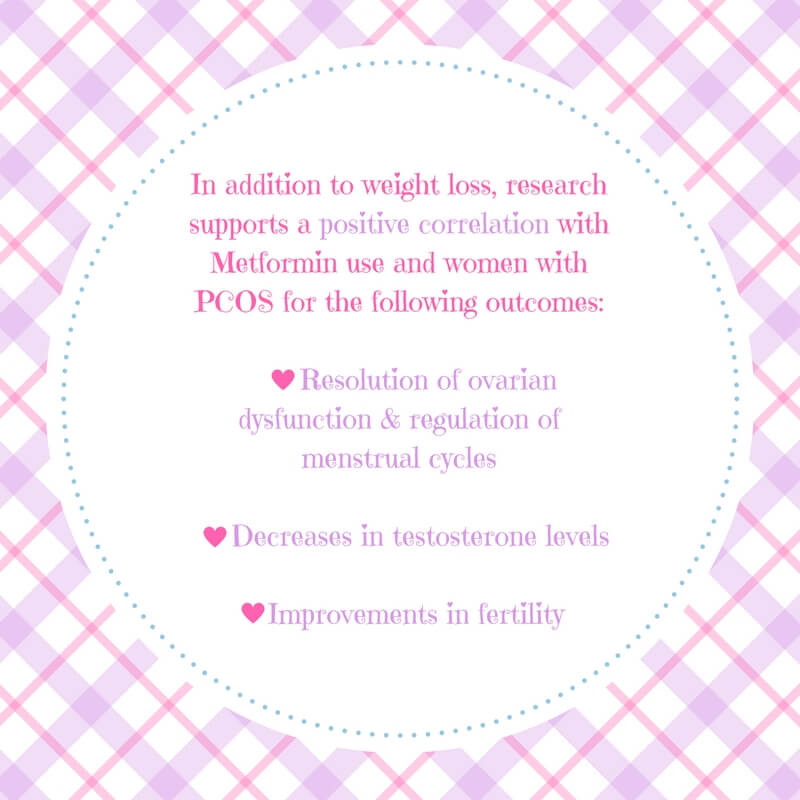
Metformin is also likely to delay diabetes onset and has a role in PCOS in those at high risk of diabetes. Boom!
While I do not think it is a miracle drug by any means, I personally have seen many of the positive outcomes I described above in my patients. However, with that being said, these same patients are also strongly adhering to my dietary and exercise advice AND are compliant with taking their metformin. You cannot have one – without the other!
Therefore for many women who have PCOS, taking metformin should be a no brainer due its profound impact on metabolic and reproductive function.



References:
- Nieuwenhuis-Ruifrok AE, Kuchenbecker WK, Hoek A, Middleton P, Norman RJ. Insulin sensitizing drugs for weight loss in women of reproductive age who are overweight or obese: systematic review and meta-analysis. Hum Reprod Update. 2009;15:57-68
- Glintborg D, Altinok ML, Mumm H, Hermann AP, Ravn P, Andersen M. Body composition is improved during 12 months’ treatment with metformin alone or combined with oral contraceptives compared with treatment with oral contraceptives in polycystic ovary syndrome. J Clin Endocrinol Metab. 2014;99:2584-2591.
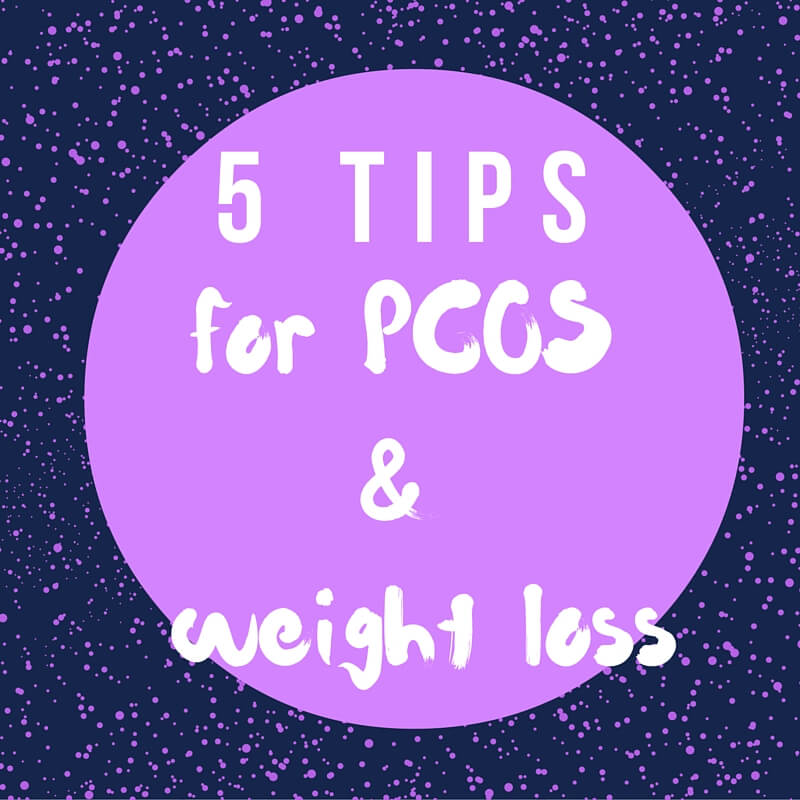
by AmyPlano | Aug 2, 2016 | Weight Loss
Hello Cysters!
There no denying it – most women who have PCOS are overweight. While we are not entirely sure why this population tends to be more overweight than not – we cannot deny the evidence. The number one reason why people come to see me when they have PCOS is for weight loss. Therefore, I thought it would be helpful to put together my top five tips for losing weight when you have PCOS. I feel like I could go on and on about this topic – but I decided to keep it short and sweet – like me!
1. Become a carbohydrate counter
Most women with PCOS are very sensitive to carbohydrates.
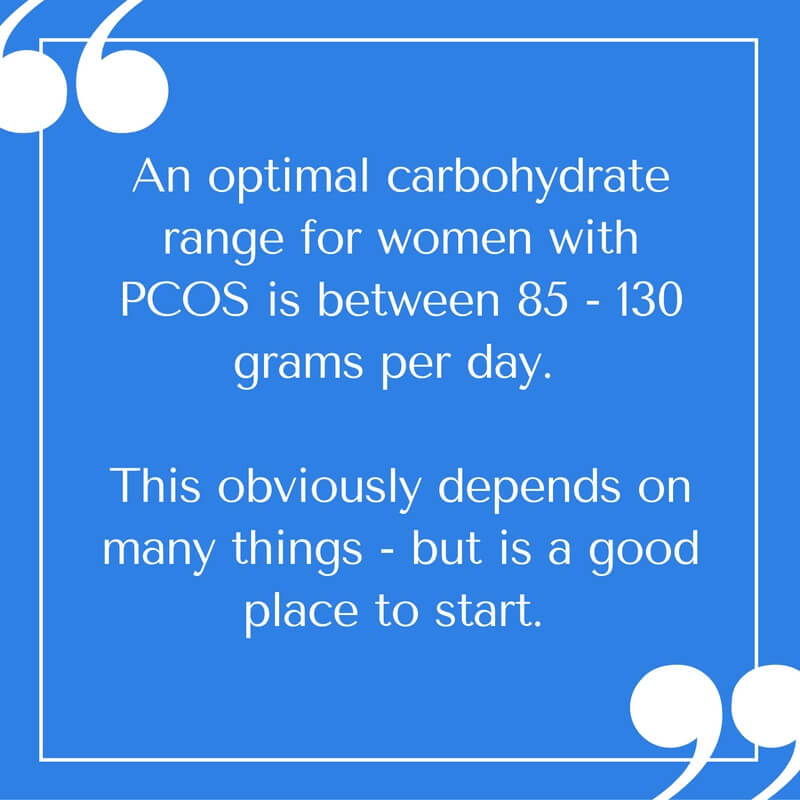 For some cysters, they just look at a food containing carbohydrates and they gain weight! Therefore, rather than count calories – count the amount of carbohydrates you consume on a daily basis. For most women with PCOS a good range is about 85 – 130 grams to support weight loss.
For some cysters, they just look at a food containing carbohydrates and they gain weight! Therefore, rather than count calories – count the amount of carbohydrates you consume on a daily basis. For most women with PCOS a good range is about 85 – 130 grams to support weight loss.
2. Push the Protein for PCOS and Weight Loss
Women with PCOS benefit from consuming lean sources of protein throughout the day. Examples of lean sources of protein include foods such as Greek yogurt, eggs, egg whites, low-fat cheeses, chicken, lean cuts of steak, lean ground beef & turkey, as well as some cuts of pork, white fish and low-sodium deli meats. Protein takes longer to digest and allows women who have PCOS to feel full for a longer period of time. Protein also helps stabilize blood sugar levels in women with PCOS that in turn helps to curb cravings.

3. Don’t shy away from fat
I see too many women who have PCOS and are fat phobic. It drives me nuts! No pun intended. Fat shares many of the same weight loss principles as protein. It delays gastric emptying, stabilizes blood sugar and plays a key role in hormone production. Aim to consume healthy fats such as nuts, seeds, avocados, olive oil, and natural nuts butters. I like to see about 30 – 35 % total daily calories coming from healthy fats to help facilitate weight loss in women with PCOS. Depending on the calorie level you are following this comes out to around 45 – 65 grams of fat per day.
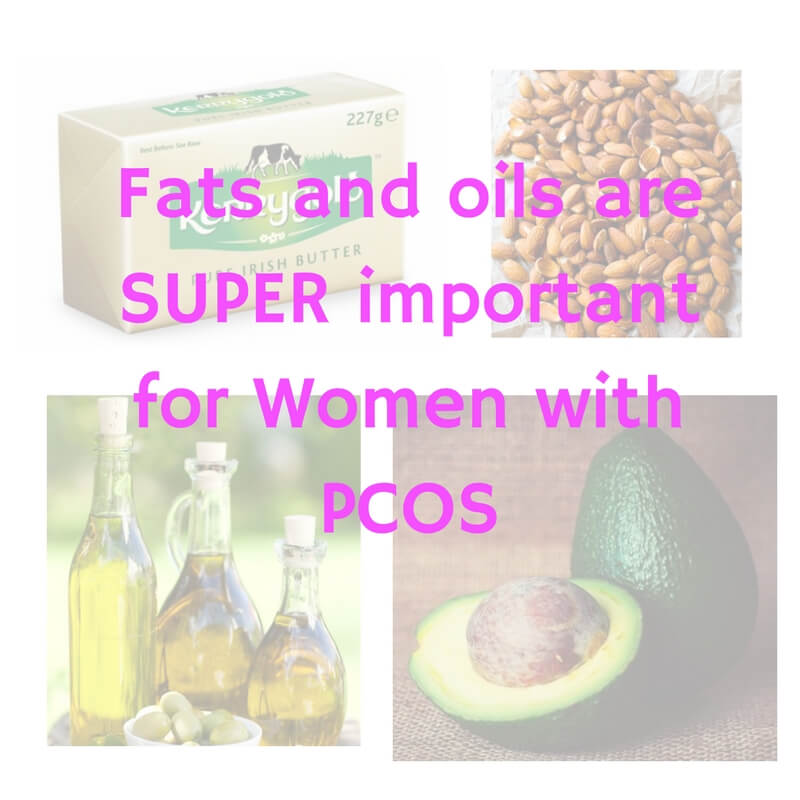
Hip-Hoo-Horray for Fats for Women with PCOS.
4. Establish regular eating patterns
Many women who have PCOS suffer from fluctuations in their blood sugar that can cause them to feel weak, tired, light-headed, and irritable. These symptoms are exacerbated when they skip meals and go long periods of time without eating. Sound like you, cysta?!?
You have likely heard the saying, “Fail to plan, plan to fail.” Do your best to consume a meal or snack every 3 hours. This helps prevents you from becoming hangry (and we don’t want that – do we?) and eating anything that is not nailed down. Take the time to establish regular eating patterns and you will be glad you did. “I am so pissed I planned and prepped my meals and snacks,” said no cyster ever.

5. Rock your veggies
Veggies are chock full of vitamins, minerals, phytonutrients and fiber. There are so many awesome properties of fiber. Fiber helps keep you full, optimizes cholesterol levels and helps control large rises insulin when you eat. Sounds like the trifecta of weight loss!
Aim for about 30 grams of fiber per day. You can consume unlimited amounts of non-starchy vegetables to help meet these requirements. The only vegetables you need to count towards your carbohydrate count are peas, corn, potatoes and the winter squashes. Any other vegetables you can consume in unlimited quantities. So rock those veggies and reap the weight loss benefits of fiber.
I was really struggling to keep it at five key points for you cysters. The tips for women who have PCOS seems infinite in my mind – but I had to choose the one I felt were the most important. I hope you learned something about where to focus your attention when it comes to weight loss and PCOS. While I know it is not easy – I am confident with the right resources you can AND will lose weight. And always remember — you are so much stronger than you think.
Gosh, I know YOU must be chock-full of tips for weight loss. I would love to know what tips you have found helpful for weight loss and PCOS. Please share them with our community in the comments below.



by AmyPlano | Jul 29, 2016 | PCOS Medications, Weight Loss
New PCOS Drug on the Horizon
Wow cysters this is HUGE! Finally some promise on the horizon for treating women with PCOS. A new PCOS drug has just completed a phase 2 clinical trial. And the results seem quite promising! Yay – Hooray!
Will this drug help “cure” PCOS?
While there is no solid consensus for what causes PCOS, we do know there are several trends that exist in this population. One of these trends is that women with PCOS tend to present with higher than normal levels of Luteinizing Hormone (LH) and elevated testosterone levels. It is the “pulse” of these two hormones that is speculated to be responsible for both the absence and abnormalities seen in the menstrual cycles of women with PCOS. This new PCOS drug has the potential to correct these hormonal abnormalities. However, the data is preliminary and much more extensive testing is required. Also due to the fact that PCOS is a syndrome, it is unlikely any single drug would resolve the myriad of symptoms many women with PCOS experience.
When should we expect to see the new PCOS drug on the market?
It is important to note this PCOS drug has just completed the second of three phases of rigorous testing. In the third and final phase, the drug will be tested in a much larger, diverse population of women with PCOS. Currently the stage 2 phase only examined the effects of the drug after 7 days. In order to successfully reach the market, the new PCOS drug will need to under go much more clinical testing. We can likely assume that the investigators will be interested in the long-term effects of this drug as well as whether or not it can be used side-side with the administration of fertility drugs. But it is likely several more years before these studies are complete.
So until then we will continue to know what works best – diet – exercise – sprinkled with a little metformin and ♥
Fingers crossed — 🙂
Here is a link to the article. You can click on the actual trial within the press release to examine the various treatment protocols and study demographics.

























